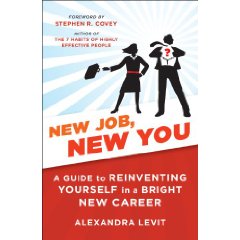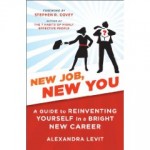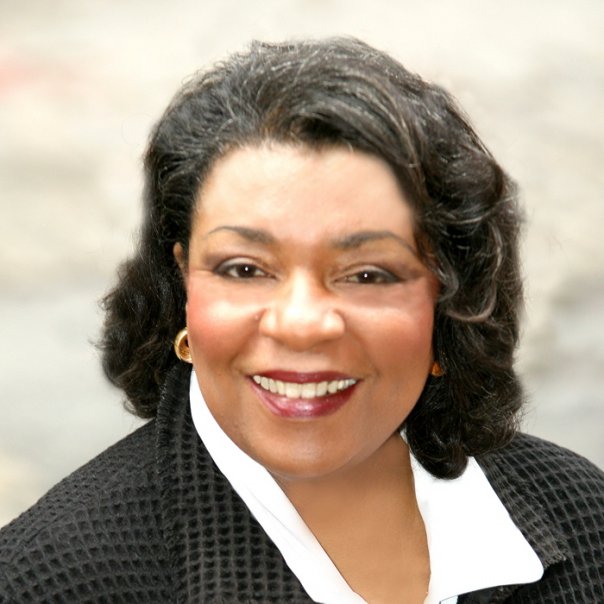 In the following interview, Wall Street Journal columnist and author Alexandra Levit talks to Landmark Forum Leader David Cunningham and a successful Landmark Education graduate about career choices.
In the following interview, Wall Street Journal columnist and author Alexandra Levit talks to Landmark Forum Leader David Cunningham and a successful Landmark Education graduate about career choices.
Alexandra Levit: Hi everyone. My name is Alexandra Levit, and I am joined today by Landmark’s David Cunningham and today we are going to be talking about how to make a meaningful career change in the new year. My name is Alexandra Levit, and I am a Wall Street Journal columnist and the author of the brand new book, New Job, New You: A Guide to Reinventing Yourself in a Bright New Career.
David Cunningham is a communication expert and seminar leader for Landmark Education, which is a well known international training and development company. More than one million people have done Landmark Education programs, such as its flagship weekend course, the Landmark Forum, to cause breakthroughs in their performance, communication, relationships and overall satisfaction in life.
 Alexandra Levit: So glad to be here this morning and have the opportunity to ask you these questions. First of all, I’d like to start with David. David, how do you think childhood experiences put people’s career choices on default? What have you seen around the world as you teach people to reinvent their lives?
Alexandra Levit: So glad to be here this morning and have the opportunity to ask you these questions. First of all, I’d like to start with David. David, how do you think childhood experiences put people’s career choices on default? What have you seen around the world as you teach people to reinvent their lives?
David Cunningham: Well, things happen as we’re growing up, things – we have school experiences, we have experiences with money, we have experiences with success, we have experiences with failure, and it’s not just the experiences, Alexandra, but what happens is we add something to those experiences. In other words, as we’re growing up, children, young adults, they make decisions based on those experiences. Decisions about themselves like I’m good at this; I’m not good at that. Decisions about circumstances in life like this is possible; that’s not possible. Decisions about other people like people like this about me; they don’t like that about me. Decisions about money.
And it’s the decisions we make, what we add to those life circumstances that then are the things that when we are out to invent a career, take a career step, those are the things that color, if you will, that limit our choices, limit what we can think of for ourselves.
Alexandra Levit: Well, David, you know, a lot of people are feeling very stuck in this current climate. Either they’re in a job that they feel is not personally meaningful or they’re just not sure what the next step is to take. What are some of the steps you recommend to get out of this rut, get unstuck?
David Cunningham: Well, the first thing, Alexandra, would be – is to really separate out what are the facts that you’re dealing with versus what do you add to those facts. In other words, you know, the facts sound like this: My current career is, and I make – and this is my current salary. Facts sound like this: The opportunity for me to be promoted in the next six months is this. Those are the facts. What people add to those facts, things like I’m not successful enough, I am successful enough, I’m not educated enough, I am educated enough, I’m good at this, I’m not good at that, what they add to the facts is the thing that gets in the way.
So, one of the things you can do that’s really simple and really clear-cut is just separate out the facts you’re dealing with from what you add to those. It even works to make two different lists, Alexandra, on two different pieces of paper. Here are the facts I’m dealing with and here’s everything I’ve added to those facts, and then when you go to work on just the facts versus what you add to them, you get a lot of power.
Alexandraw Levit: I think that’s great advice because we put so many of our own perceptions onto situations, and to be able to just look at those facts and say, “you know, maybe the situation is not quite so bad as I thought,” I think is critically important. So, that’s great advice. Some questions that I get all the time have to do with career change but specifically, how do you move into a career where you don’t have to start at the very bottom. So, do you have any suggestions for moving into a new career that’s actually an advancement for you? How would you take some steps to move into a career that might be a little bit bigger than you or you might not have all the right experience right away? Any ideas on that?
David Cunningham: A couple of things, Alexandra Levit. I think it’s a great question. One is to – first is to be willing to think big for yourself, right? Is to literally be willing to say, “Here’s exactly what I want. Here’s exactly the kind of job I would want.” To think bigger than you might normally think. Step outside the nine dots, as they say, right? And think big for yourself. And then, again, what there is to distinguish or what there is to notice is, every reason you’ve got why you don’t think that can happen.
You’ll notice there’s almost always – when there’s what people want and then there’s the reasons they have why they don’t think they can have it, and it’s really important to get that, all the reasons, and separate those out, and then you’ve got – again, you’ve got a choice. You can either have what you want in life or you can have the reasons why you can’t have it.
So, two steps: One is, again, think big, think about what you really want. Be willing to be bold about that, say what you really want. Then two, notice all the reasons you’ve got why you don’t think you can have that, and get – again, like we said, those are reasons, and those aren’t – you can either go to work on the reasons or you can go to work on having what you want. That would be the first step.
Alexandra Levit: I think that’s great advice. Sometimes people feel stuck because they don’t really know the way out. They’re not sure what the next step to take is, and I usually recommend to people that they try to change their perspective or do something that makes them see the situation a little bit differently. But sometimes it’s hard for people to do that, and I’m curious what your suggestions are for actually gaining that in perspective and maybe accessing some wells of creativity within yourself so that you’re able to see a situation in a different light.
David Cunningham: Well, Alexandra, one of the things that’s really important is for people to get that there is no view or perspective that’s the right one, you know? If I literally – if we just took the desk that’s – if we’re sitting at a desk and took the desk in front of us, we have a certain view of that desk right now, just from where we’re sitting. But if we stood up and walked around the room, we could get probably 20 different views of that same desk. And if we brought another person in the room with us, guess what? They’d have a different view of that same desk.
So, with something as simple as a desk, you’ll notice there’s many different views one can have of it, and none of them are the right view, and no two people can have the same view. Even if we put our heads real close together, we actually will still have a different view of it, no matter what. So, one of the really important things for people to get is that whatever perspective they do have, whatever view of the situation they do have, is a possible view, it’s a valid view, and it’s only one view. And just getting that allows people, Alexandra, to be free to even consider new perspectives and new views. That would be the first thing.
And then, how do you get those new views, right? Well, there’s several ways you can get those new views. One is to be asking different people. Talk to a lot of different people and be willing to consider what they say. Really think it through. What do they say? And you might not always agree with it or you might have a slightly different perspective, but the number of people that you talk to and you get many different perspectives of the same situation, every perspective will have something valuable and something useful in it if you look from there.
Alexandra Levit: Great advice, great advice. You know, David, Landmark and me, myself and my columns and my writing, we’re always talking about breakthroughs. I’m just curious for our listeners’ sake – can you explain what exactly you think a breakthrough is? How do people know that they’re having a breakthrough and how do they lead themselves to be a little bit closer to that breakthrough?
David Cunningham: Yes. Let me distinguish first between a breakthrough and an improvement. An improvement is when things get incrementally better over time. A breakthrough is when there’s a quantum leap. You’re operating at a certain level of effectiveness, and all of a sudden, there’s a leap. It’s unexpected and you find yourself at a new level of effectiveness, but it wasn’t in any way incremental. It really is a leap from point A to point B. And even in hindsight, if somebody says, “Do you know how you did that?” you might go, “No, I’m not sure.” All you know is that you’re thrilled with this new level of effectiveness. That’s called a breakthrough, when there’s a discontinuous leap in your performance. And so, it goes way beyond improvement, which is incremental. So, that’s what we would mean by a breakthrough.
Alexandra Levit: Thank you for clarifying that. That actually helps me a lot because – helping me to look at my career in a new way and kind of look back and determine where the breakthrough points were versus a lot of what I’ve been through in my life, I think, is the incremental improvement, but there are a few points that I can identify, and you’ve just helped clarify that for me.
David Cunningham: And that’s where it takes a new view. A breakthrough doesn’t happen inside the normal just trying more of what you’ve already done or trying to do better at what you’ve already done. If you’re trying to do more or better of what you’ve already done, you can be sure that what you’re gonna get is improvement. For a breakthrough to happen, it really – you really have to be willing to get a new view. Now, the question is, how do you get a new view, right?
Well, there’s two ways to get a new view. One way is literally to – it’s what we call looking into your blind spots, Alexandra. You know when you drive car and you look in the rearview mirror and you look at the side view mirror and you even turn your head, right? But there’s a spot behind you you just can’t see?
Alexandra Levit: Right.
David Cunningham: That’s called the blind spot, and the blind spots, you’ll notice two things about ’em. One, that’s where all the trouble comes from. If you back up and hit something, it was in the blind spot, right? And the second thing, though, is it’s from the blind spots, it’s where breakthroughs come from. You know, E = mc2 had to come from not just something that wasn’t thought before but Einstein had to be willing to think something nobody else was even thinking before. So, in Landmark Education, we call it the domain of what you don’t know and don’t even know you don’t know. When a human being gets access to being able to think from there, that’s where breakthroughs will come from, and your access to thinking from there, believe it or not, has a lot to do with communication and language. New language gives new access to thinking. So, one of the things we work with in the Landmark Forum and Landmark Education is giving people access to vocabulary and language that allows for new views of life.
Alexandra Levit: Yes, and I think the risk taking portion of that is something that we should emphasize because it’s not always the safe thing to do. In fact, the people that I talk to on an everyday basis, a lot of them are very concerned about taking these risks and doing things that might lead to a breakthrough, and they’re actually somewhat in a rut without even knowing it. So, do you have any ideas for identifying the signs that you’re in one of these ruts and that you might wanna take this action that leads to a breakthrough?
David Cunningham: Well, certainly you’re in a rut – here’s a real telltale sign, okay? If you’re complaining a lot to your friends and family about your job, right? And if you find, you know, you come home and you walk in the door and somebody’s there and you find yourself complaining or you’re out at a party even and you find yourself complaining or you find yourself in staff meetings, you notice you’re doing a lot of complaining, for sure you would be in a rut. That’s a telltale sign that you’re in a rut if you spend a lot of your time complaining. And one of the things that it’s really important to get is that complaining really makes no difference ever, does it?
Complaining just more or less keeps you inside a reality that what you’ve got isn’t good. So, that’s a real telltale sign is if you’re complaining. Another telltale sign is that if the things that come up, even the tough situations that come up to be dealt with in your career, you find to be a problem or annoying versus a challenge. So, if in the normal course of the day what you’re dealing with, it occurs – the way it looks to you is “this is a problem” or “this is something that – oh, I wish this wasn’t happening” versus “this is a challenge for me,” that’s another way you can for sure tell you’re in somewhat of a rut.
Alexandra Levit: I think that those are great distinctions and I would caution people, too, to actually take a look at their own personalities to determine are you just one of those people who likes to complain or are you genuinely in a job situation that you need to improve, and just maybe for some of those people, David, I’m wondering how can you assess – is there some sort of litmus test to know that you’re actually in a job that you enjoy and you should stay in? And that maybe there are times that are tough and you will have setbacks, but still you are in the right place? Is there a way to tell?
David Cunningham: Well, I think one way to tell for sure is – there’s two pieces to it. One is that your performance is extraordinary, right? So, there’s performance and there’s fulfillment, Alexandra. And some people settle, you know, there’s extraordinary performance and you’re getting promoted and you’re making the money you wanna make and you’re not fulfilled, and for some people, there’s no performance, they’re not actually making the money they wanna make or not making the – getting promoted the way they want to.
So, the thing that we would be committed to always in our Landmark programs is people get both. They both get the performance – they’re getting the promotions they wanna make or able to, you know, if they wanna branch out on their own and be an entrepreneur, they have what they need to start their own businesses and really can take that step for themselves and are successful in that.
So, it’s a matter of both performance but it’s not merely performance because if people are just performing but they’re not fulfilled, they’re not happy about it. They aren’t lit up by it and, again, the challenges, if the challenges that come up, if the way they seem to you is like a great challenge, like, “Good – this is where I really get to show my stuff. This is where I get to express myself. This is where I get to really put my whole heart into something.” If the challenges that come up are fulfilling in that way versus defeating, chances are you’ve got something that you’re – you know, you’ve got a job that is really working for you and is a job that you’re gonna love.
Alexandra Levit: Oh, that’s great, and I think it’s important that you pay attention to those indicators on kind of a daily basis and take the time to do that self-reflection and determine how you feel. You know, David, people ask me all the time about passion. “What does it mean to live my passion?” “What does it mean to find my passion?” I think “passion” is one of those big words that makes people a little nervous sometimes. And we talk a little bit about the fact that passion has a person feel that certain quote/unquote “zing” in a job. At Landmark, how do you teach people to find their own passion? Is there a formula for it? What are some of the steps that people might take?
David Cunningham: Well, one of the things first, Alexandra, that we have to have people be clear about is that passion doesn’t come from the circumstance. A job doesn’t give us passion. For instance, people can take a trip to Paris and have a terrible time, can’t they? At the same time, people can be vacuuming their house and it picks up that final piece of lint and they’re like, “Wow,” they’re like satisfied with that, right? They have a satisfying vacuuming moment, so to speak, right? So, it’s not the circumstances of life that give us the passion.
The first thing to get is that if people are looking for some circumstance to provide the passion, they’re setting themselves up for a disappointment anyway ’cause even if something does apparently – like you get a new job and you’re passionate at the beginning and you think, “Wow, this job really, really, really does it for me,” right? It will set you up for disappointment because what if the circumstances in that job change? What if you get a new boss that all of a sudden, the new boss isn’t the same way the old boss was? So, it’s really important for people to get that the passion doesn’t come from outside. It doesn’t come from the circumstance. Passion comes from giving your whole heart to something.
You know, when you and I give our whole heart to something, it really doesn’t matter what that thing is. If we give our whole heart to – I’m gonna be silly for a minute, but if we give our whole heart to cleaning the garage, guess what? Cleaning the garage is a satisfying experience. If we go through the motions, drag our feet, do it halfheartedly, then guess what? Cleaning the garage is pretty much a burden and no fun. So, one of the things we really work with is framing people up to give their whole heart to something.
And you know, Alexandra, over people’s life experiences, there’s a lot of things that just over time, people stop giving their whole heart to. Again, it could be those childhood experiences where either they gave their whole heart and got disappointed or they gave their whole heart and got rebuffed or they gave their whole heart and got embarrassed, but for a lot of reasons, people start being more cautious later in life versus giving their whole heart to things. So passion is a function of being wholehearted about things.
Alexandra Levit: Yes, I totally agree, and I think what you mentioned about being mentally present is critical because especially in today’s environment with all the technology and all the social media, the tendency is to be doing a million things at once and to never be truly focused and putting your whole heart into the tasks we’re doing at the time, and as a result, you never really get the fulfillment even if you do enjoy your job. So, I think that’s a great perspective for our listeners who perhaps aren’t looking to change their careers but to make their daily lives more invigorating and more satisfying.
David Cunningham: Yeah. To really be present with what’s in front of you, what you’re at work on, you know, being present is very simple. People, I think, think it’s more complicated than it is. Being present is a function of having what’s so be what’s so. In other words, what’s going on, what’s happening, the facts, the events are the events without judging them, when you can let what’s happening be what’s happening without judging it. And there’s always a lot happening, there’s a situation.
Like there’s a person talking, that’s happening. There’s also the thoughts you’re having while that person’s talking. There’s also the emotions you’re having while that person’s talking. There may be other things going on around you while that event is happening. To let it all be happening without judging it, without evaluating it, that lets a person really be present. So, that’s an important thing, to be able to give your whole heart to something.
Alexandra Levit: Yeah. Thank you for that specific because I sometimes feel like that advice is easy to give but not necessarily to practice, so thank you for the specific suggestion for that.
Part two of this interview will feature Levit’s interview with a Landmark Education graduate about her career.




1 comment
[…] Continued from the Part 1 […]